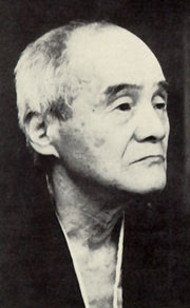Hajime Tanabe
 was a Japanese philosopher of science, particularly of mathematics and physics. His work brought together elements of Buddhism, scientific thought, Western philosophy, Christianity, and Marxism. In the postwar years, Tanabe coined the concept of metanoetics, proposing that the limits of speculative philosophy and reason must be surpassed by metanoia.
was a Japanese philosopher of science, particularly of mathematics and physics. His work brought together elements of Buddhism, scientific thought, Western philosophy, Christianity, and Marxism. In the postwar years, Tanabe coined the concept of metanoetics, proposing that the limits of speculative philosophy and reason must be surpassed by metanoia.Tanabe was a key member of what has become known in the West as the Kyoto School, alongside philosophers Kitaro Nishida (also Tanabe's teacher) and Keiji Nishitani. He taught at Tōhoku Imperial University beginning in 1913 and later at Kyōto Imperial University, and studied at the universities of Berlin, Leipzig, and Freiburg in the 1920s under figures such as Edmund Husserl and Martin Heidegger. In 1947 he became a member of the Japan Academy, and in 1950 he received the Order of Cultural Merit. Provided by Wikipedia
1
Published: [1990]
Superior document: Currents of encounter vol. 6
